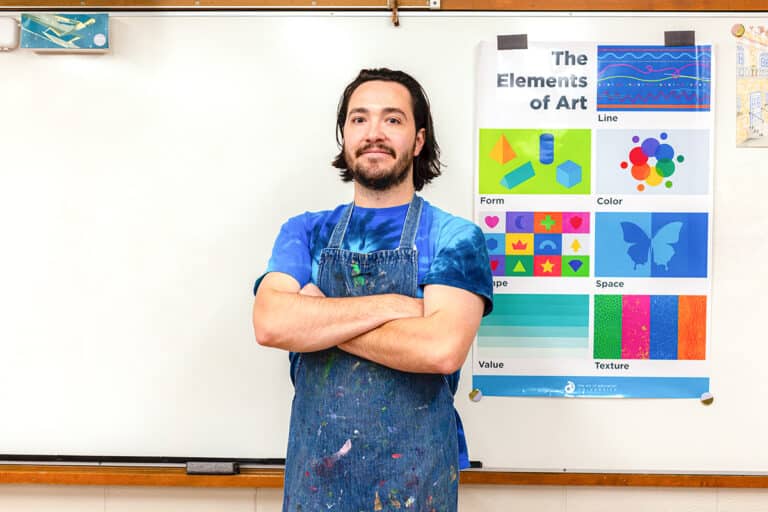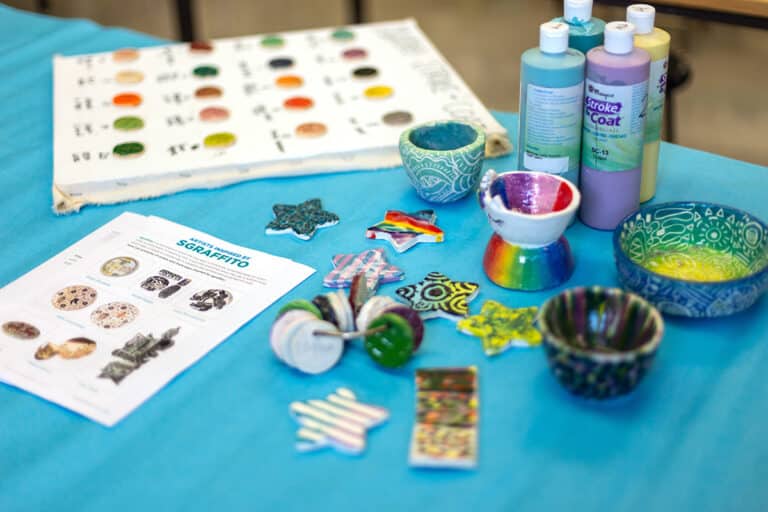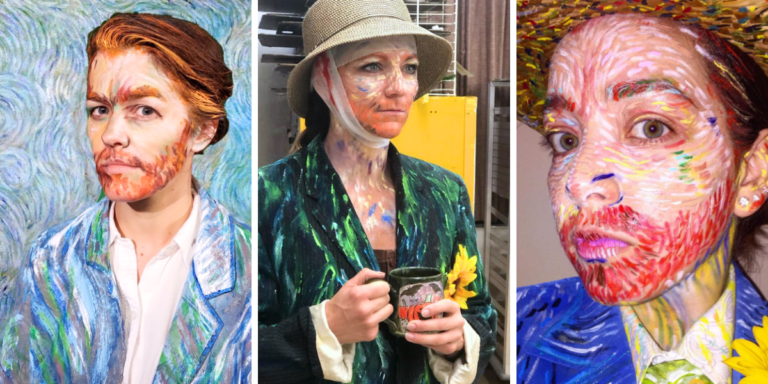When you are barely treading water, the last thing you want to do is add another meeting to your day. But what if that meeting fills your bucket and reignites your spark for teaching? What if that meeting builds you up and reminds you of all the things you are doing right? What if that meeting actually makes your life—dare we say—easier?
Working with a learning support coach or instructional coach can provide all of these boosts and more! Get out of your bubble, connect with someone outside your hallway, and get the support and care you deserve. I recently spoke with two learning support coaches at a high school in Illinois about why all art teachers should work with an instructional coach.
What is a learning support coach or instructional coach?
Learning support coaches (also called instructional coaches) are certified teachers who are experts in pedagogy and can support teachers from all content areas. They typically take on this different role because they are passionate about how instructional support and methods impact student achievement on a larger scale. Some coaches continue to teach part-time in the classroom, while others dedicate their full day to the coaching role.
The specific job duties of a learning support coach vary between schools. Responsibilities typically include supporting teachers in the classroom with co-planning, co-teaching, and modeling instructional strategies. Coaches are also often tasked with facilitating professional development for all faculty.
Just like being a teacher, being a coach is multi-faceted. Emily Valaitis, an English teacher and learning support coach at a high school in Illinois, describes herself as “a therapist, friend, advocate, and cheerleader to teachers.” She explains how her role can apply to many different tasks from one classroom to another. Valaitis observes, “For many teachers, they just need a sounding board, someone who will listen to and help them make sense of whatever it is they are dealing with, such as curriculum, lesson planning, classroom management, personal issues, etc.”
Next, let’s answer some common questions about how art teachers would benefit from the support of an instructional coach.
“I’m a great teacher. Why would I need to work with a coach?”
Often, teachers feel they don’t need to work with an instructional coach unless their performance or evaluation score is suffering. This misconception simply isn’t true! All teachers, regardless of experience or evaluation rating, need the opportunity to talk and vent. Valaitis shares how all teachers can use an outside perspective for suggested edits to their curriculum or tips for revamping their classroom management techniques.
Anna Kraftson, a science teacher and learning support coach at a high school in Illinois, equates some of her experiences to the popular television show, The Voice, where “there are four celebrity coaches, and they are all competing to work with this phenomenal singer.” She goes on to share, “I work with teachers who are phenomenal teachers, and I get to help them achieve their goals.” Such personalized feedback is particularly constructive for art teachers. Kraftson explains, “When you’re in the arts, it’s challenging to find relevant professional learning. When these teachers come to me, we work on their targeted goals that are deeply relevant and meaningful to them.”
“What should I work on with my coach?”
Approach your learning support coach with your personal goals in mind. You might be new to your school and looking for ways to further connect with colleagues outside your classroom. Maybe you are non-tenured and need an extra nudge as you prepare for your evaluation. You may even be a highly experienced veteran looking to spice up your lessons.
The reasons for seeking time with an instructional coach will change over time. Valaitis says, “I work with a wide variety of experiences and disciplines. Typically, I meet with tenured teachers who are on (an evaluation) cycle or are looking to brainstorm ideas for lesson plans or units.” For a newer teacher, however, Valaitis offers a wide array of advice. “My meetings with non-tenured teachers tend to be more diverse,” she says. “We will meet about evaluation procedures, but a lot of time is also spent talking through acclimating to our school and culture.”
Before you walk into your first meeting, take some time to reflect on your teaching and the support you need. Once you have determined your goals and shared them with your coach, the next step is to meet regularly. While another meeting in your day can feel like a drag, Kraftson explains, “Weekly meetings can anchor the teacher to make choices efficiently.”
Consulting with an instructional coach can help you:
- Prepare for an upcoming evaluation
- Learn about or try a new instructional strategy
- Add depth to your strategies
- Promote stronger learning connections
- Develop differentiated instruction
- Integrate cross-curricular instruction
- Diversify content
- Find support in areas outside your expertise (such as literacy goals)
- Engage students with more collaborative strategies
- Appropriately scaffold to support student development and deeper thinking
- Analyze data and create responsive lessons
- Design more authentic assessments
- Infuse the latest technology to increase access
Outside of direct instruction, a coach can help you:
- Navigate peer-to-peer conflict
- Engage reluctant students
- Communicate personal boundaries
- Hone your teaching philosophy
- Write a grant and use other advocacy tools
- Translate the latest PD or school-wide initiative into your art world
- Connect with your school community
“Will my coach tell my supervisor or administrator about my challenges?”
If you are struggling to hit those proficiency marks or are working with a challenging student, rest assured, your coach will not judge you or share sensitive conversations. Not only are they not your supervisor, but their goal is to support and guide. Connecting with a coach about your school’s evaluation process can be an enlightening experience. As you work through the year, your coach can also provide documentation of your growth and how it aligns with your school’s goals and initiatives.
Valaitis views her role as a guide rather than an all-knowing expert. “I tend to approach all coaching appointments with the same philosophy: the answer is in the room,” she says. She facilitates conversations by encouraging teachers to develop their own ideas instead of giving them the “answers.” Like with our students, this method produces more “authentic coaching and develops teachers more meaningfully,” she says.
“My coach isn’t an art teacher! How can they actually help me?”
It’s true: most instructional coaches are not coming from the art room. Don’t let a little difference scare you off! Teachers from every department have unique perspectives and experiences to share. Your coach will look at your teaching through a wider instructional lens, and your ideas will feed into their work with other teachers as well. Ultimately, instructional coaches want what’s best for student learning. Quality teaching is quality teaching, regardless of the content.
When you plan your next upcoming unit, consider running it by your coach to get their objective feedback. “Art teachers are typically experts in their content and just need help with the instructional piece,” Valaitis confirms. “Because of this, they don’t really need a coach who has a background in art. They just need a coach who can help them think through their ideas.” We are great at coming up with creative and innovative solutions; however, we may sometimes find it hard to reign our energy in and plan. A coach can help art teachers connect the dots and ensure we aren’t missing vital parts of the lesson planning process.
“How does working with a coach impact others and my school?”
Teaching doesn’t happen in a vacuum. The work you examine and the ideas you explore impact others. Working with a learning support coach gives others insight which then spills into other content areas. Kraftson and Valaitis love working with art teachers because of the out-of-the-box ways we think.
Art teachers are so creative! We can have ingenious solutions to school-wide problems, and an instructional coach can be a bridge between the art department and administration. Valaitis explains, “Tapping into art teachers for advice and their perspectives for school issues is imperative.” Working with an instructional coach can help give art teachers a “push to be involved in the school improvement plan or committees that influence professional development. Their fresh perspective and innovative thinking can help influence the direction a school can go,” she says.
Kraftson goes on to share how working with art teachers has influenced her as an instructional coach. “Thinking flexibly is one of the Habits of Mind we teach at our school,” she says. “When I think of the attributes of this habit, the creative process comes to mind. Understanding this process would be beneficial for both staff and students.”
Valaitis has observed how the creative process in the studio parallels the creative process in lesson planning. Teachers ideate their lessons and projects, then go back and forth between reflection and revision. Neither artmaking nor designing lessons are static processes.
“Why should I become a learning support coach?”
Art teachers are creative problem solvers and thinkers. Reflect on the impact you can make working alongside your colleagues, helping them work through their challenges. Kraftson loves being a learning support coach. “I am passionate about adult learning and view it as a vehicle for change because each teacher impacts roughly 125 students per year,” she says.
In Valaitis’s perspective, art teachers make great instructional coaches. “Art teachers are naturally empathetic, which I believe is essential to being a good instructional coach,” she says. “Coaches need to have compassion and be open-minded, two things art teachers excel at.”
Many of us became art teachers because we love learning and discovering new things. Valaitis shares how a renewed focus on our own learning process can make the coach role so rewarding. “While I loved my students and teaching,” she says, “I realized so much of my joy came from the front-end and researching topics. This job allowed me to explore my favorite parts of teaching.” By changing roles, you might be able to utilize your greatest strengths to have a greater impact. “I always liked lesson planning for my own classes and saw this as an opportunity to help others and learn more about the process,” she says.
Remember, you are the expert in your content area classroom. Working with a coach doesn’t mean you are a lousy teacher or have failed your students. As lifelong learners, we are continually modifying and adapting our lessons, strategies, and goals. Working with a coach who is there to focus solely on you and your goals gives you much-needed space and time. So what are you waiting for? Schedule your meeting today!
What are your professional goals as you move into the new year or semester?
In what ways can you envision working with an instructional coach?
Magazine articles and podcasts are opinions of professional education contributors and do not necessarily represent the position of the Art of Education University (AOEU) or its academic offerings. Contributors use terms in the way they are most often talked about in the scope of their educational experiences.











